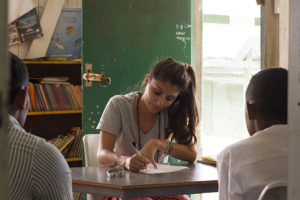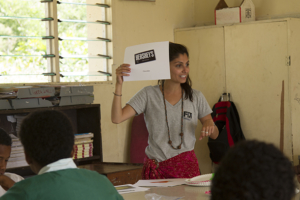“So…Cabo next break?” jokes a global medicine student in the elevator. His classmates laugh and roll their eyes. Last spring break they donned scrubs, not bathing suits, while taking a course in a remote area of Panama only reachable by boat.
The students reunited Aug. 23 in Aresty Auditorium as one of several cohorts to discuss their experiences at the Global Citizenship Roundtable, hosted by the Keck School of Medicine of USC Master of Science in Global Medicine program.
More than 100 students and guests gathered to share and learn from stories, photos, videos and findings of students who traveled the world to study health and health care. At the daylong symposium, students compared and contrasted their experiences and highlighted how the journeys changed their understanding of what constitutes health care access challenges.

Global medicine alumna Rasa Rafie interviews Fijian schoolchildren about nutrition, sugar consumption and health on the island of Malolo. (Photo/Courtesy Evan Schell)
Working with UNICEF, clinics, hospitals, ministries of health, rehabilitation centers and partner universities, global medicine students traveled abroad for courses in India, Nepal, Denmark and Panama. In each country they learned about common health issues affecting communities as well as unique issues they confront delivering care.
Students who traveled to Denmark drew comparisons between U.S. health care and the Danish social system. This presentation sparked the interest of Danish exchange students who were visiting USC for the week as part of an exchange program between the global medicine program and the University of Southern Denmark.
During the course in Panama, students witnessed and supported the work of a mobile health clinic run by Floating Doctors, a nonprofit organization dedicated to delivering health care to rural communities in Central America.
The organization’s founder and CEO, Benjamin LaBrot, MD, presented the keynote at the roundtable. He emphasized the complexities and frustrating realities of global health work and the traits needed to confront them: vision and drive.
Despite the many problems students will face in trying to improve global health care, he reminded them, “there is always something that can be done.”
Also among the students who presented were recipients of the Dhablania and Kim Family Global Medicine Fellowship, which supports Keck School students and residents interested in researching or studying global medical need. Now in its second year, the fellowship awarded approximately $50,000 to 13 students in 2015-2016.
The DK fellows’ projects examined different aspects of health systems around the world, including attitudes towards secondhand smoke in China, health services in rural Nigeria, prenatal care in Panama and oncology in Haiti.

Global medicine alumna Rasa Rafie conducts a classroom activity to understand children’s baseline knowledge of nutrition in the Fijian village of Solevu. (Photo/Courtesy Evan Schell)
In Fiji, fellow Rasa Rafie analyzed children’s sugar consumption. She led activities and interviewed students in primary and secondary schools to assess their dental histories, diets and understanding of nutrition.
“I chose to focus my research on the pediatric population because, as we learned in many of our global medicine classes, in any emergency situation children will always be the most vulnerable — and in this case, also forgotten,” she said.
As expected, sugar was a problem. But during her research, Rafie found an even bigger dietary problem among the Mamanuca Island children: salt.
“I realized that most of these kids are eating instant noodles and tin fish two- to five times per day,” she said. “This means that they were consuming upwards of 5,000 milligrams of sodium daily” — more than three times what the American Heart Association recommends.
By participating in educational trips and research, global medicine students witness firsthand the health needs of individuals and communities worldwide. In the process they become global citizens who value cross-cultural understanding and building connections across diverse societies, according to Elahe Nezami, PhD, the program’s director.
“When you see the problems of the world, you will never be able to rest and say, ‘I’m not going to do anything,’ ” said Nezami, an associate professor of clinical preventive medicine (educational scholar) and associate dean for graduate programs. That’s why the students in her program travel thousands of miles away from home each year to learn, she explained.
“It is a responsibility for anyone who is in health care to learn about the world, to give back to the world.”
For more information about the Master of Science in Global Medicine and its opportunities abroad, visit http://keckmed.usc.edu/msgm/
— Larissa Puro


